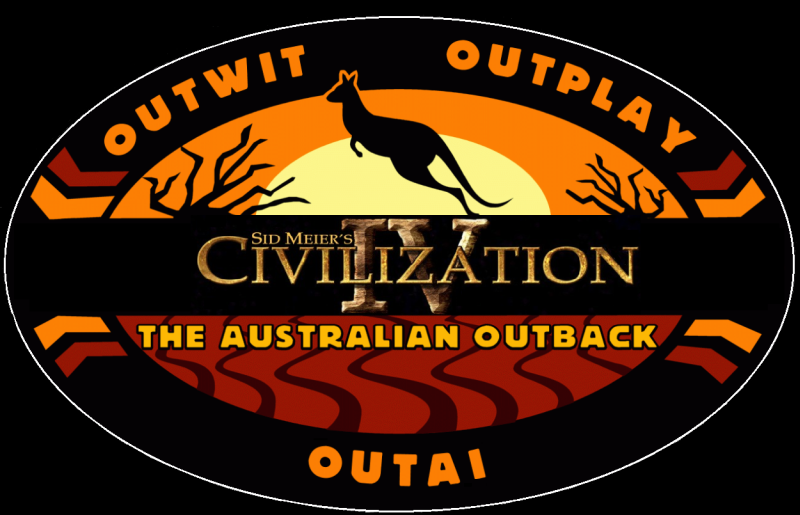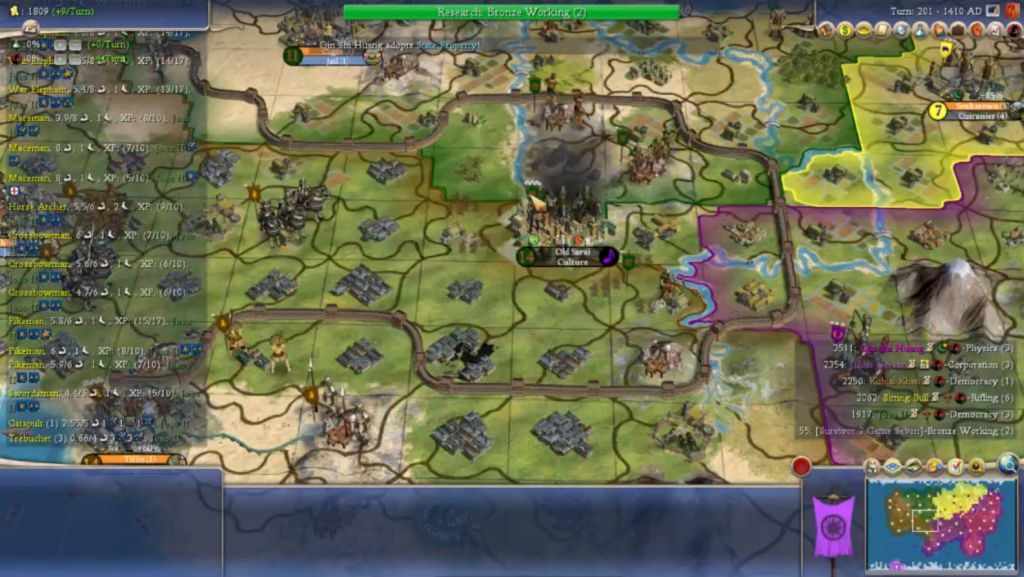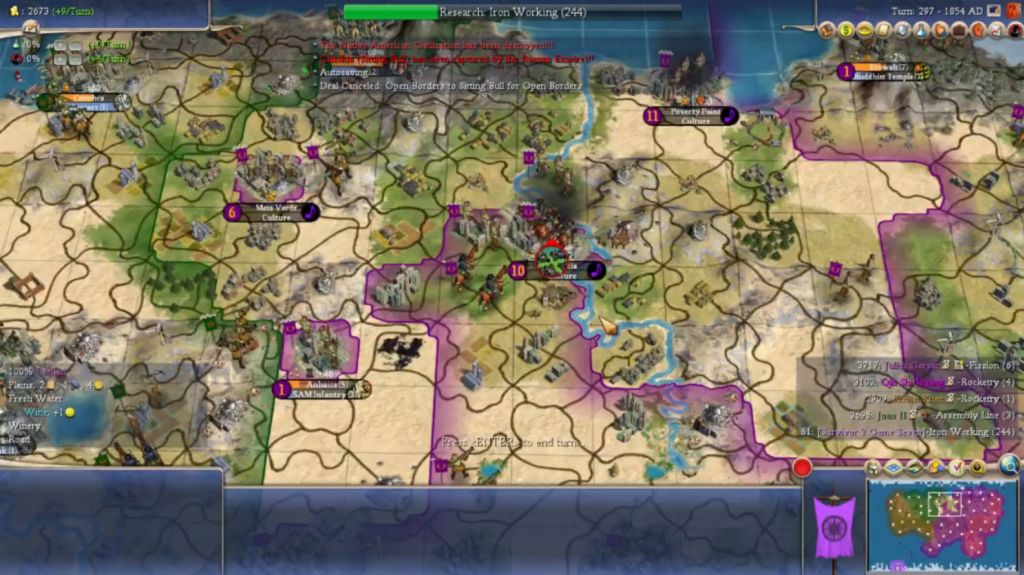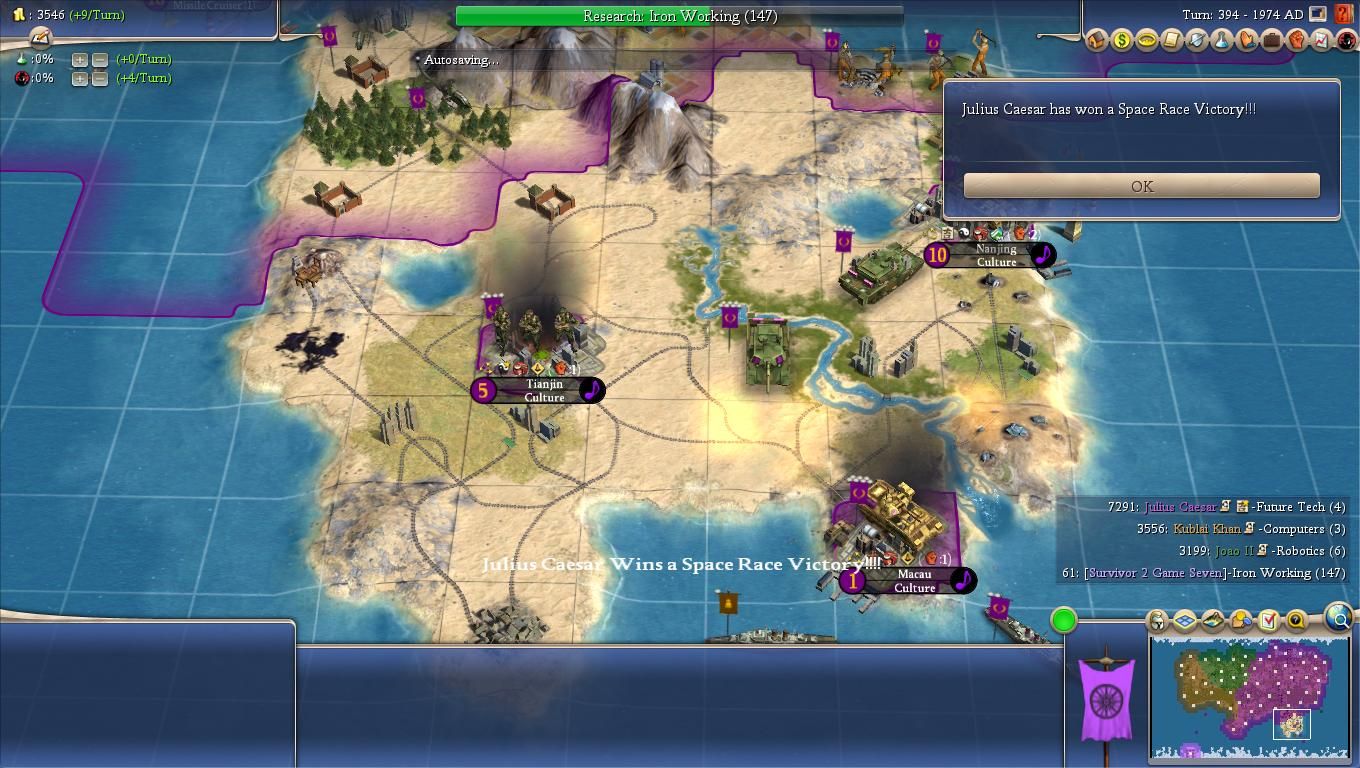


Axiis was kind enough to write another summary for Game Seven. This one was long enough that I pulled a few images from the Livestream to accompany the text. Thanks again!

AI Survivor 2 Game 7: Veni, Vidi, Vici
The second to last game of the opening round of the second AI Survivor series looked like a bloodbath waiting to happen. The board looked like a map of the USA drawn by someone with only the vaguest idea of the United States' geography - a very derpy America. Derpymerica was divided between the passive "good" leaders in the north and the aggressive "evil" leaders in the south. Lincoln was dropped in the northeast, Sitting Bull in the mid west, Joao in what would roughly be like North Dakota, Kublai Khan in the southwest, Caesar in Texas, and Qin Shi Huang in the southeast. Like in game seven, the first two religions of the game were totally up in the air as everyone lacked mysticism.
The first set of settlers moved out in generally smart directions except for Sitting Bull’s, who immediately went towards the north coast. The first two religions of the game went to Lincoln and Caesar, who founded Christianity and Confucianism respectively. The big loser in the early religion race was Qin, who had lost out to Lincoln and consequently had to deal with holy city culture pouring out of New York on his northern border. Caesar, for his part, got a second lucky break when he popped bronze working from a goody hut. He immediately made a very early swap to slavery and started whipping away. Lincoln solidified his hold on the northeast by planting Boston south of Washington, while Joao and Sitting Bull extended themselves towards the center of the map. Joao’s choice to go south was good news for Kublai Khan, who went to work gobbling up the west coast. Joao never would cross the desert that stretched to the north shore, giving Kublai the run of the coast. It wasn’t particularly good land, but the Khan would end up with the most productive land grab phase. The other big move from the early land grab phase was Caesar finding iron and planting a city directly on top of it, allowing him to start up production of his praetorians as soon as he had the city hooked up.
The first religious bloc of the game formed around Christianity as Lincoln slowed down his settling to spam missionaries. Sitting Bull and Joao would eventually flip to Christianity, uniting the peaceful northern civs into one bloc. Qin might have joined up too, but Lincoln suffered a bad break when Islam, a minority religion in America, bled over to China. Kublai would eventually swap over to Islam, before getting converted to Roman Confucianism. Unsurprisingly, the peace weights and religious affiliations of the civs divided the map into northern and southern spheres that would make life miserable for each other.
The misery making would start sooner rather than later, as a mean looking stack of Praetorians started moving east out of Roman territory. Lincoln and Caesar did not like each other one bit, and Lincoln had amplified his border tension with China by plopping down San Francisco directly on the Chinese border in a spot that could only have been chosen to troll Qin. Qin sucked it up for the moment, choosing instead to settle the southern peninsula, but it was not long before China began building up for a war. Meanwhile, that Roman stack crossed the border and went after New York. Caesar didn’t have the muscle to take New York on hand though, and his second attack, targeting Chicago, also failed. Third time, however, was the charm, and Caesar drew first blood when Chicago fell. Lincoln’s problems were just beginning, as San Francisco emancipated itself from the Emancipator and joined China, who was looking increasingly bellicose. Around the same time, Kublai Khan joined Caesar in Confucianism, creating the scary prospect of America being dogpiled by the south.
When the horns of war sounded again, though, it was for Joao marching on Mongolia. At first blush this war looked vaguely suicidal, since Portugal sat way below the far larger Mongolian empire on the power chart, and it looked even worse when Jo’s stack was ripped apart by the Khan when they set foot in Mongolia. Kublai-Joao war counter: 1.
In the east, Qin was eyeing the staggering Americans with interest. Lincoln seemed to have temporarily given up on Chicago and consolidated his forces in New York in anticipation of a Roman attack. Qin, sensing weakness, declared war and joined Caesar in the battle for New York. When the Roman/Chinese forces marched on the city, though, Lincoln decided it was the right time to make a play for Chicago and he marched a stack of potential defenders right out of New York. Fortunately for Lincoln he was able to reinforce his key city before his enemies converged, and he caught another break a few moments later when the Chinese attacked before a large stack of Praetorians arrived. Despite their setbacks, Rome and China continued chipping away at New York, though their progress was further slowed when Lincoln teched to feudalism and started popping out longbows. With the siege of New York not really progressing, Qin decided to target Boston, counting on Lincoln prioritizing the Christian holy city over the Athens of America. The two cities would hold out for a time, but Lincoln couldn’t defend them both at once, and Boston fell as a casualty of prioritization, with China gaining the first major prize of the game. The siege of New York then took a turn for the worse when Lincoln tried to preemptively attack a stack coming for his city. He miscalculated, attacking into a forest and throwing away a significant chunk of his defenders. The next time Rome and China pushed on New York, the city finally fell, with Caesar stealing the prize out from under Qin’s nose. Lincoln was now firmly in a death spiral, and the two southern bullies quickly partitioned America. China seized Washington and Atlanta, giving Qin control over the eastern seaboard, while Caesar conquered the last two American cities, knocking out the great Emancipator on turn 161. With his last breath, Lincoln cursed the south and converted to Islam.

Back in the west, Joao and Kublai were slugging it out. Though Kublai had the superior army on paper, things were not going so well on the battle field. The inevitably horse archer heavy Mongolian armies were getting shredded by Joao’s war elephants, and Joao managed to march in and conquer Old Sarai, Kublai’s fortress city on the Portuguese border. However, Joao wasn’t able to make much progress beyond that, and he and the Golden Khan made peace after a stack of Joao’s catapults got annihilated by opportunistic Mongolian horsemen. Joao returned Old Sarai in the peace, and they set about preparing for round two. Old Sarai Control Changes: 2
Once Lincoln was gone, the world settled into a tenuous peace; Rome and China had their blood up from their successful conquest of the Americans, while Mongolia and Portugal had some serious bad blood - different religions, different peace weights, and the little matter of Joao’s war declaration made them bitter rivals in peace and fierce enemies in war. Meanwhile, Sitting Bull, the king of turtling, was fortifying his territory, wary of the southern civs that had bulldozed his friend Lincoln. With protective longbows in Chitzen Itza enhanced cities, it was going to take a monumental effort to take Native America.
The fragile peace first broke in the west. Kublai Khan had rebuilt his armies and was ready to take another shot at Joao, declaring war just after Lincoln was eliminated. The Khan had been busy rebuilding his armies, and Mongolia still had a significant size advantage over Portugal. However, Joao had been busy building up his defenses, and Kublai apparently thought better of his attack once he got a good look at the defenses of Lagos, Joao’s southernmost city. Only a handful of turns passed before peace returned to the west. Kublai-Joao war counter: 2.
Over on the east coast, Caesar had merely whet his appetite for Americas. With his Lincoln killing stack still grouped in the northeast, Caesar decided to keep on keeping on and marched on Native America. Unfortunately for the Romans, they had to deal with things like the 125% cultural defense enhanced longbows in Mound City that shredded Caesar’s stacks. Once Sitting Bull had a chance to suicide his own attack on Chicago, Rome and Native America made a frustrated peace. Now with no wars to distract them, the civs occupied themselves with the race for liberalism. Qin had a commanding lead, but an ill-timed revolt to bureaucracy allowed Jo to win the race by a single turn and take astronomy.
Sitting Bull, meanwhile, passed over high minded pursuits like astronomy and liberalism, opting for more practical military techs. With two aggressive leaders on his doorstep and the Mongols lurking in the southwest, Sitting Bull knew he had to keep his military up to par. He popped a golden age, which was extended when he built the Taj Mahal shortly after. His wise tech choices would pay off when Qin came calling. Native American cuirassiers took the field against Chinese knights, giving Sitting Bull a decisive edge. His more advanced units slaughtered the backwards Chinese military, and he made a serious push on Chengdu. Qin was finally forced to make a humiliating peace, handing Chengdu over to the Native Americans. Sitting Bull’s triumph was short lived, though, because Rome came marching in immediately after China and the Native Americans made peace. Chengdu fell to the Romans a turn after it had been handed over to Sitting Bull. That proved to be the extent of the action, though and after a few indecisive skirmishes peace again returned to the east. Chengdu would prove to be a nice little steal for the Romans, as the city sat at the hinge point of the Roman empire, connecting Caesar’s American conquests to the Roman heartland. It also sat at the northwest corner of the Chinese empire and the southeast corner of Native America, so it’s no surprise that this strategically valuable city would end up seeing so much action in this game.

It should come as no surprise that while Rome and China were busy smashing their armies against the walls of Sitting Bull, Joao and Kublai were once again slugging it out in the land between Lagos and Old Sarai. This time it was Joao declaring war, and he quickly smashed up the Khan’s armies and conquered Old Sarai again. It should also come as no surprise that Portugal and Mongolia once again made a quick peace, with Old Sarai returning to Mongolian control.
Kublai-Joao war count: 3
Old Sarai Control Changes: 4
With stalemate once again settling in in the west, Joao looked further afield for conquest opportunities. Of course, Joao is a glass half-full kind of guy, so where he saw opportunity, everyone else saw that he was the only civ without rifling and that his army of knights might not be the right choice to take cities guarded by riflemen. Still, Joao, ever the optimist, took advantage of Qin’s weakness following his ill-advised attempt to overrun Sitting Bull and declared war on China. Predictably, his obsolete units were cut to ribbons by Qin’s rifles, but he had an ace up his sleeve in the form of one Gaius Julius Caesar. In a shocking twist, Caesar backstabbed his one-time partner in crime and joined Joao in the war on China. Despite his losses, Jo kept coming, choosing to target Xian, a city on the south end of the Chinese-Roman border. But as Joao bloodied himself in China, Kublai Khan ramped up his unit production and declared his own war on Portugal. Caught out of position, Joao was forced to make peace with China and march his units back - in the direction of Old Sarai, which he would capture with ease.
Kublai-Joao war count: 4
Old Sarai control changes: 5
Staying in the east, Caesar had a major advantage over his old partner-turned-rival Qin; he had researched assembly line and was building factories and infantry all over his territory. Caesar was the only leader with this critical tech in hand, and enjoyed a massive power and production advantage over his enemies. As Joao was turning west to deal with the Khan, Caesar was marching an army of infantry up to the gates of Washington, apparently looking to sweep down into China from the direction of old America. Qin countered Caesar’s infantry by researching… railroads. Qin determinedly avoided military parity with his enemies, but caught a happy break when Caesar backed off his siege of Washington to counter a sudden attack from Sitting Bull. Just like that, Caesar was dealing with a two front war. Unfortunately for the Native Americans and China, Sitting Bull “blew his load” (-Sullla 2015) on Seattle, throwing everything he had at the unimportant northern city. Caesar was able to capture it right back, and was freed up to conquer his second America when Qin unexpectedly dropped out of the war, leaving Sitting Bull in a supremely tight spot. The armies of Rome launched a broad attack across the Roman/Native front, with the main thrust rolling up Sitting Bull’s northeast flank.
Back in the west, things were looking grim for Joao, who was holed up in Lagos. He had captured Old Sarai, but Kublai Khan had his sights firmly set on the Portuguese core, beginning with the fortress city of Lagos that was protecting the river valley at the heart of Portugal’s territory. Unfortunately for the Khan, while he had over forty cavalry on hand to roll over the city, he only brought along two trebuchets, grinding the siege to a crawl. Every turn counted for the Khan, as Joao had built the Statue of Zeus and was reaping some serious return on investment - Kublai’s war weariness was rapidly becoming untenable and his cities suffered badly from all the unhappy faces. Lagos eventually would fall, but Kublai’s lack of siege engines was hampering his offensive efforts badly. He was able to lay waste to Portugal’s core, but no more cities would fall. As Caesar chewed through Sitting Bull, Kublai stalled out in Portugal and eventually called it quits. He returned Lagos, but Old Sarai did not change hands. Kublai was simply unable to leverage his size advantage over Joao, while the Statue of Zeus made sure the Khan suffered terribly from war weariness every time he marched on Portugal. Once again, the SoZ proved to be a hugely powerful wonder in these games.
While Kublai and Joao once again made peace - with Old Sarai finally staying Portuguese - Sitting Bull was getting no such respite from Rome. Once Qin backed out of the war, Caesar set about annexing the Native Americans once and for all. Unable to match Caesar in the field, Sitting Bull turned to diplomacy and guilt tripped Qin into rejoining the war. China had been teching away while Rome swallowed up Sitting Bull’s land and was consequently underprepared when Sitting Bull pulled him into the war. Regardless of his lack of build up, Qin sprang into action and immediately seized Roman occupied Guangzhou before targeting Chengdu and old America for attack. New York was quickly captured and Chicago put under siege while Rome scrambled to respond to China’s sudden aggression. Before Caesar could act, though, his situation was about to deteriorate further. Kublai Khan declared war on Rome.
The Mongols quickly moved into Rome’s back lines, conquering Cumae and Mediolanum. Despite the tightness of his spot, though, Caesar remained focused on knocking out Sitting Bull, and he was freed up to pursue his ambitions when Qin bowed out of the war a few turns later. Qin swapped New York for Neopolis, a city on the south coast. The big upshot of the peace, though, was that Caesar was allowed to swing north and capture his second America. He finished off Sitting Bull on turn 297, and though he was left with enemies on all sides, Caesar had finally reached a dominant position. His enemies just did not have the willpower to keep the pressure on when they had him in a three sided war, and so Sitting Bull suffered the ultimate price for his attack on Rome. Kublai Khan would make peace with Caesar soon after, ending this key war.

And with a war in the east winding down, tradition demanded that Joao and Kublai once again go at it. The Kublai-Joao war counter ticked up to 5 as Joao hoped to take advantage of Mongolia’s war weariness. In a surprise twist, the two empires failed to make any progress and when they agreed to peace, Old Sarai was returned to the Mongolian orbit, ticking the Old Sarai control change counter over to 6. Decisive war was clearly not going to be a thing in the west.
As Kublai and Jo got into yet another slap fight, Caesar started putting his territorial and tech advantages to use. Roman tanks began rolling off the assembly lines while Caesar built late industrial/early modern wonders like Broadway, the Eiffel Tower, and Christo Redemptor. However, there was one critical weakness in Caesar’s massive empire - he only controlled one source of oil on land, and that oil sat right on the Chinese border up in old America. That strategic weakness was about to be exploited to the hilt by Qin, who decided to take one last shot at Rex Caesar before the game was well and truly out of reach. Qin once again declared war on Caesar and began attacking with tanks of his own, targeting Neopolis on the southern Sino-Roman border. Qin also launched a small attack in the north, and though he was unable to capture any cities, he was able to pillage the lone oil field Rome controlled. In one stroke, Qin shut off Roman tank production and gave himself a major, if temporary, military edge. Caesar would eventually tech to plastics and connect one of his ocean oil reserves, but Qin was able to exploit his tech advantage by conquering New York away from Rome. Unfortunately for the Chinese, Rome’s industrial base was simply too large by this point in the game, and even though Caesar could only roll out infantry and machine guns, China was unable to make significant progress beyond the borderlands. The two eastern empires made peace soon after the fall of New York, with the main upshot of the war being the capture of New York for China. However, Qin would soon gift the great American city back to Rome, apparently being unwilling to deal with the Roman culture in the area. With peace in hand, Caesar began setting up options for his final victory - he built the space elevator and started cranking out space ship parts; he built the UN and was elected Secretary General; he teched to stealth and began forging a terrifying army of endgame units, full of modern armor, paratroopers, mobile infantry, stealth bombers, and, eventually, various nuclear weapons. Caesar did not have the popularity to win a diplomatic victory, as he could only count on Joao’s support in the Secretary General elections against Kublai Khan, and he was too far away for a culture victory. A spaceship victory seemed like his most likely route, but it also looked like he wanted to cause some trouble with that massive end game army before he flew off into space.
The most likely place for him to find trouble was, you guessed it, the final war breaking out between Kublai and Joao. Kublai Khan instigated the sixth war between the two western powers once Caesar and Qin came to terms, but Mongolia was once again stalling out in its offensive against the smaller Portuguese empire. Given the somewhat friendly relations Joao and Caesar had enjoyed lately, and given that some of those Roman modern armors were headed west, it looked like Caesar might be looking to repay the Khan ten fold for Kublai’s earlier treachery during the three way war that broke out as Sitting Bull was getting run out of the game. That war was not to be though, and the Jo-Kublai rivalry would live to see another day, because Qin made a supremely ill-advised war declaration against Rome.
Final Kublai-Joao war count: 6 (which was the total number of war in game 6 incidentally)
Final Old Sarai control changes: 6
Qin had chosen poorly. His offensive started promisingly enough, as a stack of 98 Chinese units rolled into Seattle and annihilated its defenders. Unfortunately for China, that was the high point of its war. Over the next few turns, Qin could only watch as his army was torn to pieces in Seattle while Romans surged across the whole Chinese border. Caesar conquered old America in short order and began rolling up China all the way down the coast. Nukes rained down on Chinese defenders as Rome ate its way through its one time ally. The final drama was not whether Rome would destroy China, but rather whether Caesar would finish off Qin before his spaceship landed. In the end, Qin was knocked out by a paratrooper taking his last irradiated city on the southern tip of Derpymerica’s Florida. China was eliminated from the wild card game on turn 393, finishing the game as the third victim of Caesar. The very next turn, Rome won by way of the Space Race, ending the game on turn 394. Qin had played a strong game, but in the end he went to war against a guy with modern armor before he even had mobile infantry, so it’s hard to say that Qin didn’t deserve it.

So game 7 was in the books, with Caesar clearly ending the game as the dominant civ. He had earned it, but he had gotten remarkably lucky, too. If Kublai Khan had been able to break Joao - say if Joao had been unable to counter Kublai’s massive horse archer force with elephants - Caesar would have had a massive rival on his west flank. If Qin had turned against Caesar earlier in the game, or if Qin and Kublai hadn’t waited so long to try to stab Caesar while he was conquering Sitting Bull, Qin easily could have come out as the top dog in the east. That didn’t happen though, and Caesar walked away with a well deserved and very dramatic win. That said, I think my favorite part of the game was Joao tenaciously holding off the forever superior armies of the Mongol Khan and even ending the game with the prize of Old Sarai. It was a tremendous underdog subplot that picked up the action pretty much every time the bullies in the east made peace. It’s going to be hard to top the drama of game 7!
Game Seven was the closest match from Season Two of Civ4 AI Survivor. The score lead was traded back and forth innumerable times, and Caesar didn't emerge as the runaway winner until the very end of the game. I'm glad that we have a writeup for this very deserving game.



